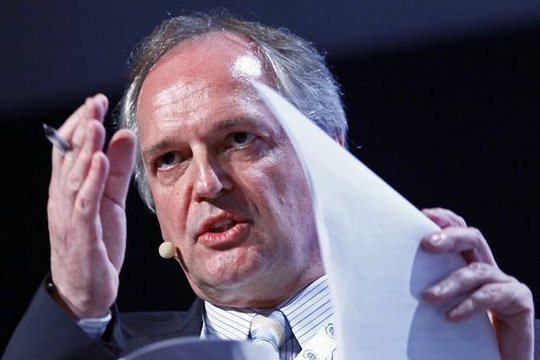
OVERVIEW
MANAGEMENT
PERFORMANCE
POSSIBILITIES
CAPITALS
ACTIVITIES
ACTORS
BURGESS
|
LEADERSHIP
ABOUT PAUL POLMAN Himanshu ... The three lessons of start-up leadership I learned from Paul Polman’s book, Net Positive 
Paul Polman Original article: https://medium.com/@himanshu_99557/the-three-lessons-of-start-up-leadership-i-learned-from-paul-polmans-book-net-positive-16fd795509bf Peter Burgess COMMENTARY I met Andrew Winston a long time ago in New Jersey after his first book. I was struck by his thoughtfulness and his embrace of both the environment and the purpose of business. I don't think he had much interest in the main issue that I want to address, that is the effective disfunction of modern corporate metrics that have an almost total focus on profit performance and benefit to owners / investors without any effective metrics for the key issues of social and environmental impact. Of course Paul Polman is a giant of business management who, when he was the CEO of Unilever moved the company from crass profit maximization to a much more balanced focus on the Triple Bottom Line. One of his interesting moves was to eliminate the staff departments that were concerned with issues like 'CSR', 'sustainability'. etc. and relocating these responsibility within the line departments where all the critical decisions and changes were actually implemented. I am reminded of the big impact that little things can have whenever I see supermarket containers from Unilever that used to be round plastic tubs and are now square plastic tubs ... a small change that made product transportation of these Unilever products significantly more efficient reducing both financial costs and environmental impact for the company. Paul Polman and Unilever took on the bad practices of the oil-palm industry in places like Malaysia ... but sadly Polman left Unilever before the many chronic palm oil supply chain abuses were fully addressed. Many of Polman's initiatives continue at Unilever, but I am not clear what direction Unilever will be taking in the future. Unilever is a big company and how it behaves does matter. Peter Burgess | ||
|
The three lessons of start-up leadership I learned from Paul Polman’s book, Net Positive
Witten by Himanshu ... CEO-ClimateAi July 17th, 2022 I had a chance to interview Paul Polmanafter reading Net-Positive. I would prescribe it as a must-read book for all start-up founders. As a climate-tech founder myself, I felt even more inspired by Paul’s leadership journey. Nothing on its own can predict the success of a startup, but every successful startup has three things in common: culture, ambition, and purpose. These three values are also the attributes of what Paul Polman and Andrew Winston call “net positive companies,” in their new book, Net Positive: How Courageous Companies Thrive by Giving More Than They Take. Net Positive talks about the relationship between companies and the ecosystems they both serve and thrive in. Such companies end up giving back a lot more than they extract from nature and society, and in turn, generating financial and societal returns. In my view, all startups should strive to be net-positive companies. Here are my top takeaways from Polman’s book as I look to make sure my own startup, ClimateAi, is net-positive. 1. Start-up founders must set ambitious goals. As Paul himself describes it: If the goal is not making you feel uncomfortable, then it’s not aggressive enough. Sometimes, as founders, you won’t immediately have the answers to how to achieve those goals and it’s alright. First of all, ambitious goals attract ambitious talent. By setting up ambitious goals in sales, product, and R&D, you are giving your most talented people a chance to step up and realize their own true potential. I like their example and analogy of Roger Bannister breaking the 4-minute mile in 1954. After his breakthrough achievement, other runners followed and also broke through this boundary. There are now over 1,500 athletes who have run sub-4-minute miles. 2. You reap long-term profits through purpose. You reap profits through purpose. For too long in the current company culture, the focus has been on externalizing costs and internalizing profits. Paul during his tenure as the CEO of Unilever generated 290% shareholder returns, ditched quarterly reporting for long-term growth objectives, and put sustainability at the core of that long-term growth objective(pioneering a strategy that has now become the buzzword for every fortune 1000 company). As start-up founders, one has to ask themselves this question- if your start-up were to magically disappear today, would the world be a better place/worse place/ same after that. Mission-driven founders, who can articulate a mission-driven strategy will end up attracting the right talent, right investors, as well as sometimes the right customers and hence, will beat their competitors in the long run. It’s ok if you get rejections from some investors/talent/customers in the short run, as building a company is a marathon and not a sprint. 3. A Start-up culture has to empower every employee. The book’s “Culture is the Glue” chapter gives great specific examples to underscore the ways companies (and other organizations) can foster better culture. The top-down OKR setting has to be balanced by the bottom-up inputs from the start-up employees. As a young lean start-up can benefit from this approach even more than fortune 1000 companies. At ClimateAi- we have a culture of micro-entrepreneurship. That means the employees should be able to make decisions on their own interpreting the values and purpose laid out by the founders. I see similar examples of employees being the stalwarts of company culture during the early days of Google as described in the book- How Google Works by Eric Schmidt et.al. ----------------------------------------------- More from Himanshu ... CEO-ClimateAi
| The text being discussed is available at | and |